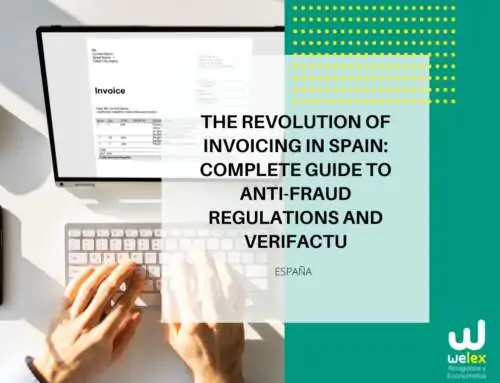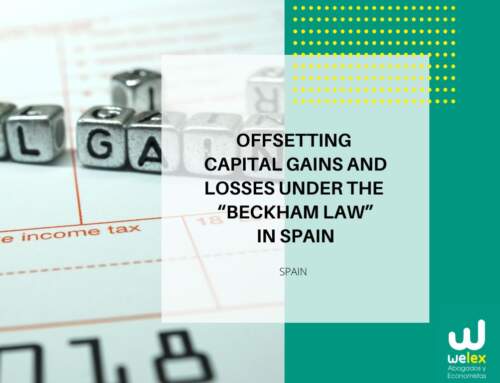The 2024 Income Tax campaign began in April, and at Welex, a law and economics firm based in Marbella, we offer you a detailed guide to help you comply with your tax obligations in Spain, whether you are a tax resident or not. In this article, we explain the key dates, the main obligations, and how we can assist you in filing your return correctly.
When does the 2024 Income Tax campaign start?
The campaign for the Personal Income Tax (IRPF) for the 2023 fiscal year starts on April 3, 2024, and ends on July 1, 2024. During this period, all tax residents in Spain who are required to file must submit their returns to the Spanish Tax Agency.
Who is required to file a tax return in Spain?
The following individuals are required to file a tax return in Spain:
- Individuals who are tax residents in Spain and have earned income above the thresholds established by the Spanish Tax Agency.
Difference between tax resident and non-resident in Spain
One of the most important aspects when determining your tax obligations in Spain is whether you are a tax resident or a non-resident. According to the Spanish Tax Agency, an individual is considered a tax resident if:
- They spend more than 183 days during the calendar year in Spain, or
- Their main center or base of economic interests is located in Spain, directly or indirectly.
If you do not meet at least one of these criteria, you are considered a non-tax resident, and your tax obligations are limited to income earned within Spanish territory.
Tax obligations for tax residents in Spain
Tax residents in Spain are taxed on their worldwide income. This includes:
- Employment income: salaries, pensions, etc.
- Investment income: bank interest, dividends, etc.
- Real estate income: rental income from properties.
- Income from economic activities.
- Capital gains and losses.
Additionally, tax residents may be required to file Form 720 if they hold assets and rights abroad that exceed certain thresholds.
Tax deductions and reductions for residents in Spain
Tax residents may benefit from various deductions in their tax return, including:
- For the purchase or rental of a primary residence (in specific cases).
- For donations to NGOs and non-profit organizations.
- For contributions to pension plans.
- For maternity and large families.
It is important to seek proper advice to take advantage of all possible tax deductions and reduce the amount payable.
Non-residents must also pay taxes in Spain
- Non-tax residents who have earned income in Spain subject to the Non-Resident Income Tax (IRNR), such as rental income, investment income, or capital gains, among others.
Tax obligations for non-tax residents in Spain
Non-tax residents are taxed only on the income obtained in Spain, under the Non-Resident Income Tax (IRNR). Common types of income subject to this tax include:
- Rental income from properties in Spain.
- Profits from the sale of properties in Spain.
- Interest from Spanish bank accounts or investments in Spanish entities.
What tax forms must a non-resident file?
- Form 210: IRNR declaration for non-residents with periodic income or rental income.
- Form 211: Applicable to the purchase or sale of real estate by non-residents.
Tax return for non-residents who own property in Spain
If you are a non-tax resident and own a property in Spain, you are required to file an annual IRNR tax return, even if you do not rent out the property. In such cases, a notional income is calculated based on the cadastral value of the property, and a fixed tax rate applies: 19% if you are a resident of the EU, Iceland, or Norway, or 24% if you are from another country.
What happens if I don’t file or file late?
Whether you are a resident or not, failing to file your Income Tax return when required can result in financial penalties from the Spanish Tax Agency. The consequences depend on the delay and whether the result is payable or refundable.
- If you file a payable return late, surcharges and interest will apply.
- If the return results in a refund, the delay may not incur a penalty, but you will lose the right to receive the amount until your situation is regularized.
Income Tax returns for foreign residents in Spain
Many foreigners residing in Spain are unaware of their tax obligations. It is essential to understand that owning a property in Spain, working remotely for a foreign company, or spending more than 183 days in Spain may make you a tax resident. If you have any doubts about your status, do not hesitate to consult with professionals who can assist you.
Additionally, some countries have double taxation treaties with Spain, which help avoid being taxed twice on the same income. At Welex, we help you interpret and correctly apply these agreements in your return.
Why choose Welex for your Income Tax return?
At Welex, we are a multidisciplinary firm specialized in tax law, accounting, and advisory services for both residents and non-residents in Spain. We offer:
- Personalized advice in your language: Spanish, English, French, and Dutch
- Review and filing of your Income Tax return, optimizing all possible deductions.
- Representation before the Spanish Tax Agency.
- Submission of Form 210 for non-residents.
- Analysis of your tax situation to avoid double taxation.
Our team of economists and lawyers work closely to ensure legal compliance and tax efficiency.
Conclusion
The 2024 Income Tax campaign in Spain is an opportunity to regularize your tax situation and, in many cases, to receive refunds from the Tax Agency. Whether you are a resident or non-resident, having the support of a specialized team such as Welex can make the difference between a correct return and one with errors or penalties.






Social Media